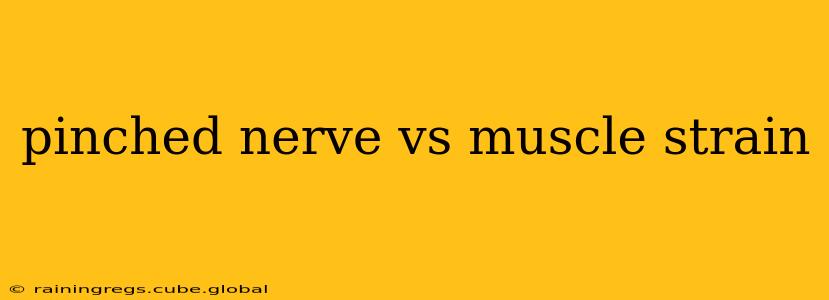Experiencing pain in your back, neck, or limbs can be incredibly frustrating. Determining the root cause—a pinched nerve or a muscle strain—is crucial for effective treatment. While both conditions cause pain, they stem from different sources and require different approaches to recovery. This comprehensive guide will help you understand the key distinctions between a pinched nerve and a muscle strain, allowing you to better communicate your symptoms to healthcare professionals and make informed decisions about your care.
What is a Pinched Nerve?
A pinched nerve, also known as a compressed nerve, occurs when surrounding tissues, such as bones, cartilage, muscles, or tendons, put pressure on a nerve. This pressure disrupts the nerve's ability to send signals properly, leading to a range of symptoms depending on the location of the pinched nerve. Think of it like kinking a garden hose—the flow of water (nerve signals) is interrupted.
Symptoms of a Pinched Nerve
Symptoms vary depending on the nerve affected but can include:
- Sharp, shooting pain: This is often described as radiating pain, traveling down the affected limb.
- Numbness: A loss of sensation in the affected area.
- Tingling: A pins-and-needles sensation.
- Weakness: Difficulty moving or controlling the muscles supplied by the affected nerve.
- Muscle atrophy: In severe or long-lasting cases, muscle wasting can occur due to lack of nerve stimulation.
What is a Muscle Strain?
A muscle strain, often called a pulled muscle, is an injury to a muscle or tendon caused by overuse, stretching, or tearing of the muscle fibers. This type of injury is common in athletes and individuals involved in physically demanding activities. Unlike a pinched nerve, a muscle strain is a direct injury to the muscle tissue itself.
Symptoms of a Muscle Strain
Symptoms of a muscle strain typically include:
- Muscle pain: Often localized to the injured muscle.
- Muscle tenderness: Pain upon touching the affected area.
- Muscle spasm: Involuntary contractions of the muscle.
- Swelling: Inflammation around the injured muscle.
- Bruising: Discoloration of the skin over the injured muscle (may not always be present).
- Limited range of motion: Difficulty moving the affected muscle.
Pinched Nerve vs. Muscle Strain: Key Differences Summarized
| Feature | Pinched Nerve | Muscle Strain |
|---|---|---|
| Cause | Pressure on a nerve from surrounding tissues | Overuse, stretching, or tearing of muscle fibers |
| Primary Pain | Sharp, shooting, radiating pain; numbness, tingling | Localized muscle pain; tenderness, spasm |
| Location | Can be anywhere along the nerve's pathway | Localized to the injured muscle |
| Weakness | Often present | May be present, depending on the severity |
| Numbness/Tingling | Frequently present | Usually absent |
How are Pinched Nerves and Muscle Strains Diagnosed?
A healthcare professional, typically a doctor or physical therapist, will diagnose a pinched nerve or muscle strain based on a physical examination, a review of your symptoms, and possibly imaging tests like X-rays or MRIs. The location and nature of your pain, along with neurological tests to assess nerve function, will help distinguish between the two conditions.
What are the Treatments for Pinched Nerves and Muscle Strains?
Treatment options for both conditions vary depending on the severity of the injury. Common treatments include:
- Rest: Avoiding activities that aggravate the pain.
- Ice: Applying ice packs to reduce inflammation (especially for muscle strains).
- Heat: Applying heat packs to relieve muscle spasms (generally used after the initial inflammation subsides and is often more effective for muscle strains).
- Over-the-counter pain relievers: Such as ibuprofen or acetaminophen.
- Physical therapy: Exercises and stretches to improve range of motion and strengthen muscles.
- Medication: In some cases, stronger pain relievers or muscle relaxants may be prescribed.
- Injections: Corticosteroid injections can help reduce inflammation around a pinched nerve.
- Surgery: In rare cases, surgery may be necessary to relieve pressure on a severely pinched nerve.
Can a Muscle Strain Cause a Pinched Nerve?
While not directly causing nerve compression in the same way a bone spur might, a severely strained muscle can indirectly contribute to nerve compression. Significant swelling from a muscle strain could put enough pressure on nearby nerves to cause symptoms mimicking a pinched nerve. This is why accurate diagnosis is so important.
How Long Does it Take to Recover from a Pinched Nerve or Muscle Strain?
Recovery time varies widely depending on the severity of the injury and individual factors. Minor muscle strains might heal within a few weeks, while severe pinched nerves could require several months of treatment and rehabilitation.
This information is for general knowledge and does not constitute medical advice. Always consult a healthcare professional for diagnosis and treatment of any medical condition.
